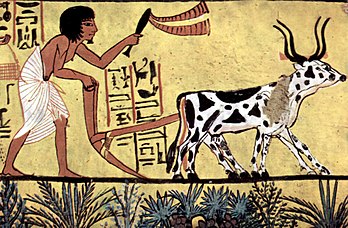 |
| Painter of the burial chamber of Sennedjem (Photo credit: Wikipedia) |
Feeding Tomorrow’s Billions: Lab-Grown Meat Products, Vertical Farms, AI-Designed Recipes, and More
Food and agriculture accounts for about 5.9% of the global GDP. Global food retail sales alone account for about $4 trillion/year, and food accounts for 15% of what American households spend each year. .... In 1790, farm jobs accounted for 90% of US jobs, compared to less than 2% today. ...... they won't be meats in the conventional sense, but something altogether new. ...... In 2012, it took 60 billion land animals to feed 7 billion humans. If successful, cultured animal products have huge advantages: 99% less land, 96% less water, 96% fewer greenhouse gases, and 45% less energy. ........ We will increasingly rely on genetically engineered crops. In 1996, there were 1.7 million hectares of biotech crops in the world; by 2010, the number had jumped to 148 million hectares. ..... More than a trillion GE meals have been served, and not a single case of GE-induced illness has turned up. ...... Vertical farms will be immune to weather, so crops can be grown year-round under optimal conditions. One acre of skyscraper floor produces the equivalent of 10 to 20 traditional soil-based acres....... Employing clean-room technologies means no pesticides or herbicides, so there's no agricultural runoff. The fossil fuels now used for plowing, fertilizing, seeding, weeding, harvesting, and delivery are gone as well. On top of all that, we could reforest the old farmland as parkland and slow the loss of biodiversity. ....... The average American foodstuff travels 1,500 miles before it's consumed. As 70% of food's final retail price is from transportation, storage, and handling, these miles add up quickly. With vertical farming and genetic engineering, production will become decentralized and distributed, allowing food to be produced nearer the location of consumption,
and food's price to plummet
....... companies turning plants into foods that look and taste just like meat and eggs.... data scientists are actively weeding out billions of proteins from hundreds of thousands of plants to learn what could form the equivalent of a chicken's egg. ....... IBM's Watson uses machine learning to construct new recipes and cocktails that no human chef would come up with....... As technology converges, the future will be a tasty, and abundant, one.











